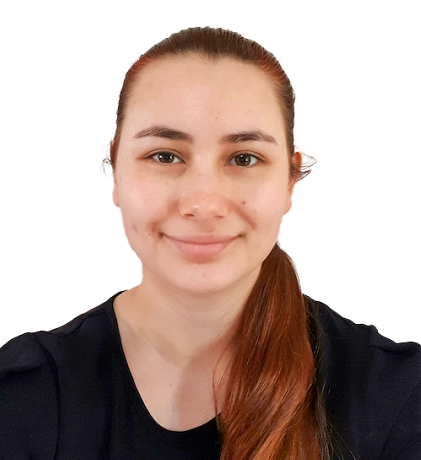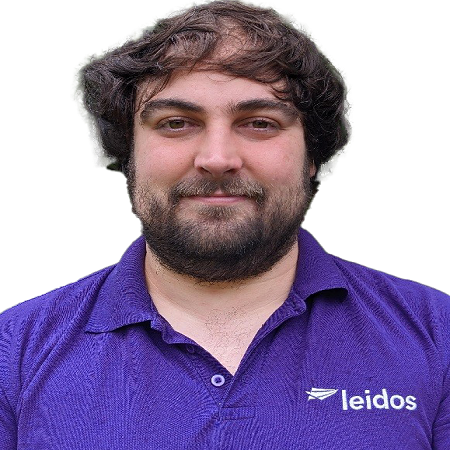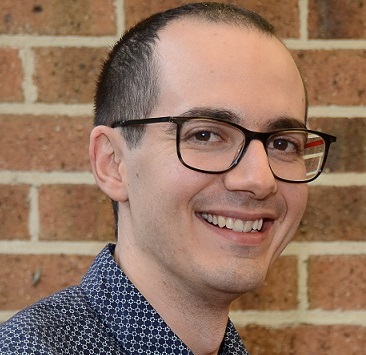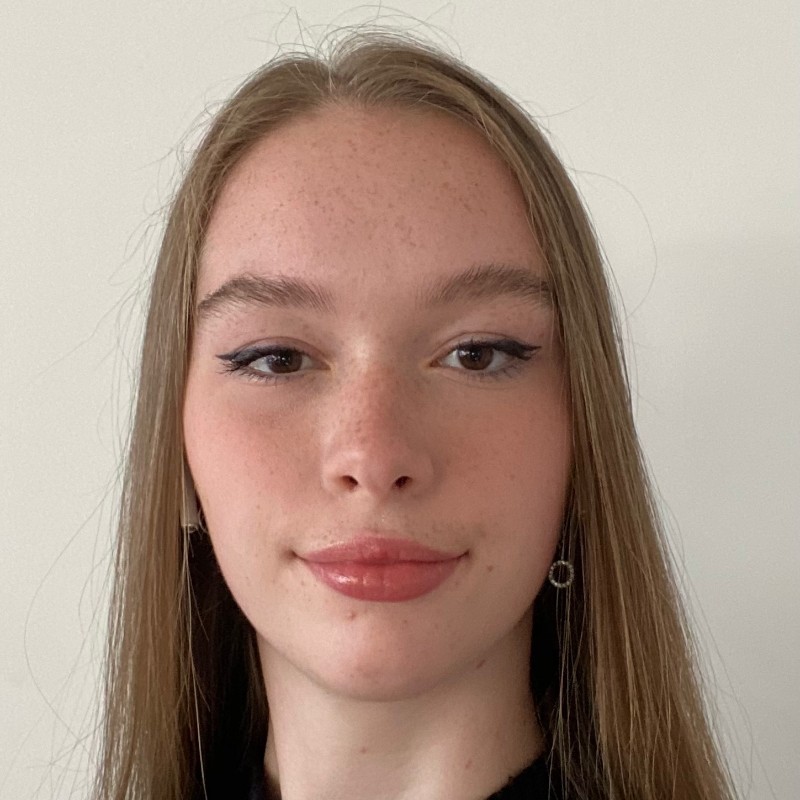Leidos
5 opportunities
Australia

Nadia Gottchalk
Project Coordinator
I’ve landed in an amazing team that has given me great development opportunities; because of this I’m now responsible for delivering a body of work within my project. My favourite part of the job is when my team and I achieve a key milestone after many months of hard work. My role also requires me to interact with lots of people including the technical team, upper management and external suppliers. I enjoy building relationships with team members and suppliers outside of Leidos as most people I’ve worked with have a really good sense of humour which makes work really enjoyable.

Shaun Blackburn
Software Engineer
What I love about my job is the work life balance it offers. This includes being able to work your hours at a time that suits you and being able to leave for the day without expectations of unpaid overtime. As long as you do your hours for the day and are at work for key meetings, the time you come in and leave is pretty flexible. There is trust there from management and it makes work a lot more enjoyable. I also go to work enjoying the idea that what I am doing has a positive impact on people and Australia as a whole, rather than just being about the bottom line.

Luke Franco
DevOps Engineer
The coolest thing about my job is the constant flow of new challenges. Each day brings a new task, so no two days are the same. One day might be focusing on a critical script that needs to be deployed to restore functionality, while another might be developing an entirely new system. This keeps me engaged, continuously learning and growing each day.

Joel Foster
What's your job about?
Leidos is all about creating solutions for our customers, and therefore has endless opportunities in a multitude of areas. Software development, engineering, management, and cybersecurity are just some of the paths that Leidos has to offer. Leidos also gives you the support to continually learn and progress your skills, while allowing you to discover what you are passionate about.
I am currently working on a large scale integration project that looks to redefine and unify current dated methods to a modern all-in-one solution. As a software integration engineer, my job revolves around connecting the different facets of our solution to create a streamlined service that can then be incorporated into the Defence network. Tasks that I do as part of my project range all the way from having a say on some of the design decisions, to implementing those decisions, along with researching new methods of doing things, and discovering and fixing issues the team encounters.
There is so much to learn that you finish each week feeling like you have formed or improved another skillset. One week could be building Java classes, the next could be learning and using a niche market product, the following week is learning how to store and sort logs to monitor health and performance of a product. All while having a strong team that can support you along the way.
What's your background?
I grew up in Sydney, and moved down to Melbourne in my mid-20’s. I studied Music Production just out of high school but never made anything of it – although music is still an important part of my life. At that point, I wasn’t sure what I wanted to do in terms of a career. I always enjoyed technology and programming but was never sure how to translate that passion into a career.
Previous to Leidos, I spent 8 years in an optical retail store. As that was never meant to be a long term career, I decided that studying towards a degree part time while continuing work would be the best option for me. In my last year of study, I started applying for graduate jobs without much hope that I would be lucky enough to get a position.
Leidos stood out from the start, and after a bit of research I realised how many interesting sounding projects they work on. After a great application process - with plenty of communication and an interview, I was one of the lucky people selected to be part of the graduate cohort for my year.
My graduate year has been amazing, with so much support, learning, and a true feeling of being part of the Leidos family. It has now been almost one year since joining Leidos and I look forward to seeing what the future years hold while exploring all that Leidos has to offer.
Could someone with a different background do your job?
Yes – if you are up for a lot of learning! Every day is a learning experience as a big part of the work isn’t strictly coding (or things you would learn in a software development degree). Although the degree makes the coding and understanding some of the concepts much easier, there’s still a lot of research, and trial and error.
If you are keen to learn, and happy to be learning as you go, most of the work could be done. It is something you really have to enjoy doing though!
What's the coolest thing about your job?
For me it’s the knowledge that what you are doing makes a huge difference to others. The project I am working on will directly impact tens of thousands of Australians immediately, and even more over its lifetime. There are not many jobs where everything you do, whether it’s a major integration piece, or a small code tweak, will impact so many people while helping them to remain safe and healthy.
You may be a small piece of the puzzle, but every piece is important in completing the project.
What are the limitations of your job?
Due to the nature of the work and the size of the project, certain things can take a long time. Making a major change isn’t an easy thing to achieve, and may have to reach all the way back to multiple teams, customers, and vendors – where time and approval is needed.
This can be challenging, and what you think is a simple thing could need some number of weeks before the change can be made. There is still plenty of other work to do though so you never feel like you’re left waiting!
3 pieces of advice for yourself when you were a student...
- Keep tabs on anything you do that can be added into your portfolio. Made a script to automate something? Add it! Did a project as part of your degree? Add it! This is a great way to show potential employers what you have worked on.
- Always aim to succeed. It’s easy to go through your degree being happy with just a pass, but you should always aim to learn as much as you can as it will put you in a good mindset of always trying your best and making the most of what you can.
- Find like-minded people. Either people doing the same degree as you, people in the industry, or just people you already know. It makes it much easier to complete your degree when you have others to speak to.

Keely Smith
7am – I start my day by waking up to my alarm. I try to aim for 7am but often I end up sleeping in another 15 minutes. I then open my blinds and start to get ready. When getting dressed I like to make sure I’m not in all black, as I like to bring a little style and colour into the office.
I have breakfast, often with my housemate who is also getting ready for their day. After this I pack my bag and sort out my lunch, which is often a pre-made meal from the supermarket. Unfortunately, I am not one for making extravagant lunches.
8am – I leave to catch the train into the city, which takes me around 40 minutes. Part of this is a 10 minute walk to the station, which is great to give me a little bit of exercise in the morning. On the train I usually listen to some music or read my Kindle to relax a bit before work.
9am - I get into the office around this time but it can vary, sometimes I start earlier so I can finish up sooner. I walk in and say hi to my friends before getting to my team area and finding a desk. My work is pretty flexible so there is always a range of people working from home as well as in the office.
I set up for the day and get started on what I was working on yesterday afternoon. Although a lot of my work is based in Java I tend to work in many areas of the project, which allows me to code in a variety of languages.
9:30am – By this time I have refreshed myself on the work I did yesterday and looked at what still needs to be done to finish the ticket. This includes tasks like writing tests and checking the acceptance criteria for anything that I’ve missed. I often write myself notes before I clock off so that I know what to focus on the next day and it’s these notes that I look over before diving into my work for the day.
My team is made up of a Scrum Master and eight Software Engineers, two of us are part of this year’s intern/graduate intake. A lot of the team have been graduates in the past, which means that there is always a friendly face who is happy to teach me about software I am unfamiliar with.
10:30am – I attend stand-up where the team and I share what we have been working on and what we are planning to do for the rest of the day. This keeps us accountable and makes sure that if anyone is encountering a problem, someone else in the team with relevant experience can offer their advice and help either by peer programming or brainstorming solutions.
I update my team on my ticket progress, including when I am likely to finish it. We then discuss some work that I will pick up once I am done, such as reviewing another teammate’s work. This is important to prevent any mistakes that a developer might have missed.
12pm – At this point I might have come across what I think is a bug in the code. When I find something like this, I must confirm a couple of things, like if it is an unwanted behaviour, if I introduced it with my changes or it’s an existing problem. Determining the root cause of a bug can sometimes be tricky in a project with a large codebase like this because there are so many different places that an unwanted behaviour can be introduced.
If I encounter this, I usually ask one of my teammates to help me sort out the bug and we end up spending a fair bit of time analysing and solving. This is one of my favourite parts of my job - working with others and peer programming. I find that it’s the way I learn the fastest and I enjoy a good chat with my teammates.
By this point the bug has usually been fixed and I start to get hungry, which means it’s lunch time. I meet up with some other graduate and interns for lunch. Most days we all bring lunch from home, but I sometimes get something takeaway from some nearby shops.
3:30pm – I continue working on my ticket. I put on my headphones and listen to some music or a podcast while I’m working to help me focus.
At the end of each sprint we show the client some features we completed as well as conducting a sprint retrospective. This is where we reflect on how the sprint went and look at what we could have done better. This helps us to continually improve and ensure we are meeting client expectations. A sprint is a short, time-boxed period when a scrum team works to complete a set amount of work and made ready for review.
5pm – I finish my workday. Often my partner will also be working in the city where we meet up to run some errands and catch a bite to eat for dinner. I’ll catch the train home and get there around 8pm to allow myself to relax before bed, usually watching a tv show or playing a video game. I’ll head to bed around 10:30pm so I can get some rest before I do this all over again tomorrow.
